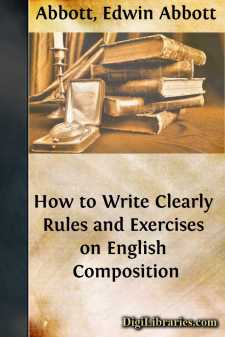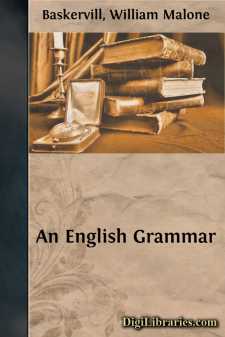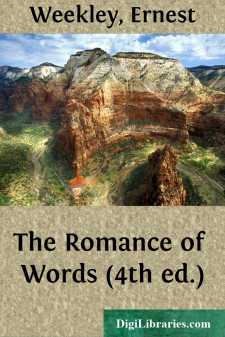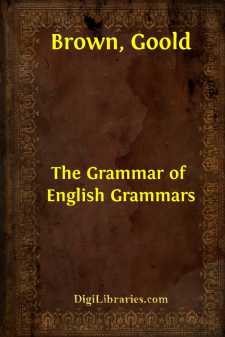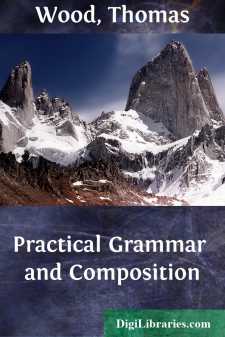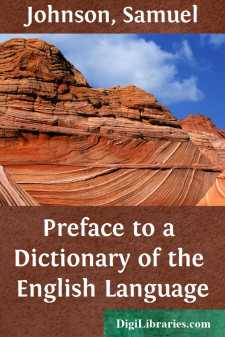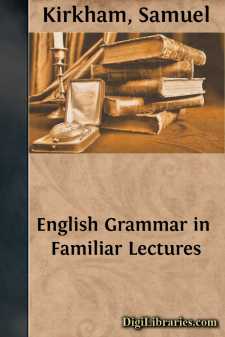Language Arts & Disciplines
Language Arts & Disciplines Books
Sort by:
by:
Alfred Ayres
PREFATORY NOTE. The title-page sufficiently sets forth the end this little book is intended to serve. For convenience' sake I have arranged in alphabetical order the subjects treated of, and for economy's sake I have kept in mind that "he that uses many words for the explaining of any subject doth, like the cuttle-fish, hide himself in his own ink." The curious inquirer who sets...
more...
I. ORIGIN OF THE WORK. About a generation ago Mr. Matthew Arnold twitted our nation with the fact that "the journeyman work of literature" was much better done in France—the books of reference, the biographical dictionaries, and the translations from the classics. He did not especially mention dictionaries of the language, because he was speaking in praise of academies, and, as far as France...
more...
PREFACE. Almost every English boy can be taught to write clearly, so far at least as clearness depends upon the arrangement of words. Force, elegance, and variety of style are more difficult to teach, and far more difficult to learn; but clear writing can be reduced to rules. To teach the art of writing clearly is the main object of these Rules and Exercises. Ambiguity may arise, not only from bad...
more...
CHAPTER I. SOME STORIES OF BRITISH HISTORY TOLD FROM ENGLISH WORDS. Nearly all children must remember times when a word they know quite well and use often has suddenly seemed very strange to them. Perhaps they began repeating the word half to themselves again and again, and wondered why they had never noticed before what a queer word it is. Then generally they have forgotten all about it, and the next...
more...
INTRODUCTION. So many slighting remarks have been made of late on the use of teaching grammar as compared with teaching science, that it is plain the fact has been lost sight of that grammar is itself a science. The object we have, or should have, in teaching science, is not to fill a child's mind with a vast number of facts that may or may not prove useful to him hereafter, but to draw out and...
more...
by:
Ernest Weekley
PREFACE A long and somewhat varied experience in language teaching has convinced me that there are still, in spite of the march of science, many people who are capable of getting intellectual pleasure from word-history. I hope that to such people this little book, the amusement of occasional leisure, will not be unwelcome. It differs, I believe, from any other popular book on language in that it deals...
more...
by:
Goold Brown
CHAPTER I. OF THE SCIENCE OF GRAMMAR. "Hæc de Grammatica quam brevissime potui: non ut omnia dicerem sectatus, (quod infinitum erat,) sed ut maxima necessaria."—QUINTILIAN. De Inst. Orat., Lib. i, Cap. x. 1. Language, in the proper sense of the term, is peculiar to man; so that, without a miraculous assumption of human powers, none but human beings can make words the vehicle of thought. An...
more...
by:
Thomas Wood
Page v PREFACE This book was begun as a result of the author's experience in teaching some classes in English in the night preparatory department of the Carnegie Technical Schools of Pittsburg. The pupils in those classes were all adults, and needed only such a course as would enable them to express themselves in clear and correct English. English Grammar, with them, was not to be preliminary to...
more...
by:
Samuel Johnson
It is the fate of those who toil at the lower employments of life, to be rather driven by the fear of evil, than attracted by the prospect of good; to be exposed to censure, without hope of praise; to be disgraced by miscarriage, or punished for neglect, where success would have been without applause, and diligence without reward. Among these unhappy mortals is the writer of dictionaries; whom mankind...
more...
by:
Samuel Kirkham
LECTURE I TO THE YOUNG LEARNER. You are about to enter upon one of the most useful, and, when rightly pursued, one of the most interesting studies in the whole circle of science. If, however, you, like many a misguided youth, are under the impression that the study of grammar is dry and irksome, and a matter of little consequence, I trust I shall succeed in removing from your mind, all such false...
more...




